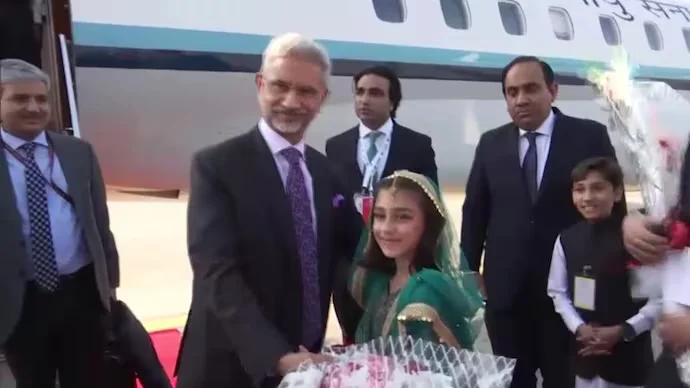External Affairs Minister S Jaishankar arrived in Islamabad, Pakistan. He is attending the 23rd meeting of the Council of Heads of Government (CHG) of the Shanghai Cooperation Organisation (SCO). The two-day summit has drawn top leaders from member states and is taking place under stringent security measures. Authorities have closed key routes and businesses in Islamabad and its neighboring city, Rawalpindi, due to security concerns.
The Pakistan Prime Minister Office (PMO) uploaded a video on its social media page, welcoming S Jaishankar in Islamabad.
This visit marks the first time in nearly nine years that an Indian foreign minister has visited Pakistan. The ties between the two neighbors remain frosty due to the Kashmir issue and cross-border terrorism emanating from Pakistan.
Also See: Pakistan & the SCO Summit: Catalyst for Multipolarity
HERE ARE THE TOP 10 POINTS:
- In preparation for the summit, Pakistani authorities have taken extensive measures to address ongoing political unrest and militant violence. Authorities have deployed troops throughout Islamabad, and they have arrested hundreds of supporters of jailed opposition leader Imran Khan. They have also enforced new laws limiting protests, although the Pakistan Tehreek-e-Insaf (PTI) party recently called off a planned demonstration.
- To ensure safety, the Pakistani government declared a public holiday in Islamabad for three days, starting Monday. Schools and businesses are closed, and large contingents of police and paramilitary forces are patrolling the city.
- According to Pakistan’s interior ministry, army troops are in charge of securing the Red Zone. This area houses the parliament, the diplomatic enclave, and the main summit venues.
- The Summit will kick off with the arrival of delegations on Tuesday. A welcome dinner will follow, hosted by the Pakistani Prime Minister. On Wednesday, the official proceedings will include remarks by Pakistan’s Prime Minister, document signings, and concluding statements. The leaders will also issue media statements and attend an official luncheon.
- During the visit, the Chinese Premier plans to engage in discussions with Pakistani Prime Minister Shehbaz Sharif and President Asif Ali Zardari. He will also meet with other key political and military figures to strengthen bilateral relations. He also plans to inaugurate the CPEC-funded Gwadar International Airport in Balochistan, a region bordering Afghanistan and Iran.
- The leaders from SCO member states attending the summit include Chinese Premier Li Qiang, Belarus Prime Minister Roman Golovchenko, Kazakhstan Prime Minister Olzhas Bektenov, Russian Prime Minister Mikhail Mishustin, Tajik Prime Minister Kohir Rasulzoda, Uzbek Prime Minister Abdulla Aripov, Kyrgyzstan’s Chairman of Ministers Cabinet Zhaparov Akylbek, and Iran’s First Vice President Mohammad Reza Aref.
- Shortly after his arrival in Islamabad, the External Affairs Minister is likely to attend a banquet reception hosted by Pakistan Prime Minister Shehbaz Sharif. Both sides have already ruled out any bilateral talks between S Jaishankar and his Pakistan counterpart Ishaq Dar on the sidelines of the SCO heads of government summit.
- In August, Pakistan invited Prime Minister Narendra Modi to the SCO summit. Observers view Jaishankar’s visit to Pakistan as a significant decision on India’s part. In his recent address at an event, Jaishankar said, “Like with any neighbour, India would certainly like to have good relations with Pakistan. But that cannot happen by overlooking cross-border terrorism and indulging in wishful thinking.
- Pakistan assumed the rotating chair of the SCO CHG for 2023-24 at the previous meeting, held in Bishkek in October 2023. The presidents of Russia, China, the Kyrgyz Republic, Kazakhstan, Tajikistan, and Uzbekistan founded the SCO at a summit in Shanghai in 2001. India and Pakistan became its permanent members in 2017.
This news is sourced from India Today and is intended for informational purposes only.






![Ukrainian and Russian flags with soldier silhouettes representing ongoing conflict. [Image via Atlantic Council].](https://southasiatimes.org/wp-content/uploads/2026/02/2022-02-09T000000Z_1319661209_MT1NURPHO000HXCNME_RTRMADP_3_UKRAINE-CONFLICT-STOCK-PICTURES-scaled-e1661353077377.jpg)